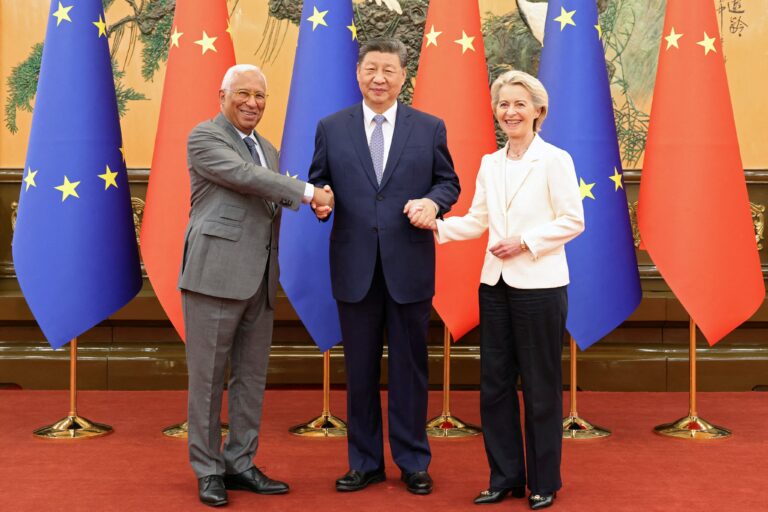China’s attempt to maintain a dual posture—supporting authoritarian regimes while seeking deep economic and technological ties with the European Union—is becoming unsustainable. The EU’s evolving foreign policy stance, driven by values, security concerns, and geopolitical realignments, is forcing Beijing to confront a strategic choice it has long postponed.
A Fracturing Partnership
- The EU has traditionally approached China as a “partner, competitor, and systemic rival.”
- China’s growing alignment with authoritarian regimes (Russia, Iran, North Korea) undermines its credibility as a neutral or constructive global actor.
- EU policymakers, especially post-Ukraine invasion, are less willing to tolerate China’s strategic ambiguity.
2. China’s Authoritarian Alliances: Strategic Calculations
a) Support for Russia
- Despite claims of neutrality, China has indirectly backed Russia in Ukraine by expanding trade, refusing to condemn aggression, and promoting narratives that undermine NATO.
- This undermines European security and questions China’s role as a “responsible global power.”
b) Engagement with Iran, Venezuela, and Others
- China deepens ties with isolated regimes, often via energy, arms, or surveillance technology.
- This reinforces EU concerns about China’s ideological alignment and export of authoritarian governance models.
c) Global South Strategy
- China courts Africa, Latin America, and Southeast Asia through Belt and Road, offering an alternative to Western liberal models.
- While pragmatic, it frequently empowers local autocrats, further alienating Brussels.
3. EU’s Shifting Stance: From Caution to Confrontation
a) Geopolitical Awakening
- The war in Ukraine catalyzed Europe’s understanding that authoritarian solidarity is a direct threat to global order and EU interests.
- China’s tacit support for Russia has led to calls for de-risking, especially in Germany, France, and the EU Commission.
b) Economic Dependence vs. Strategic Autonomy
- China is a top trade partner, but the EU is now prioritizing resilience, security, and human rights over pure economics.
- Examples: Restrictions on Chinese tech (5G bans, AI concerns), scrutiny of Chinese FDI, outbound investment screening.
c) Normative Discomfort
- Beijing’s repression in Xinjiang, crackdown on Hong Kong, and AI-powered surveillance state challenge European values.
- Civil society, parliaments, and media increasingly pressure EU leaders to match values with policy.
4. Why China Can’t Have It Both Ways
a) Strategic Distrust is Growing
- European capitals increasingly see China not as a neutral actor, but as an enabler of global authoritarianism.
- This erodes political will for deeper partnerships and opens the door for transatlantic coordination.
b) No Lasting Separation of Economics and Politics
- China has long tried to keep economics (open markets) and politics (authoritarianism) separate.
- The EU is rejecting that distinction—particularly as supply chains become strategic tools.
c) Public Opinion in Europe
- European publics are cooling on China, especially after COVID, Ukraine, and Hong Kong.
- Democratically accountable governments cannot ignore this shift indefinitely.
5. Implications and Forecast
a) China Must Choose: West or the Rest
- Beijing faces a choice: align with the norms and rules of the West or deepen its bloc with authoritarian allies—but the middle path is closing.
b) EU–China Relations Will Become Transactional
- Expect a decline in trust, more conditional cooperation, and targeted economic disengagement.
- Cooperation possible in climate, trade—but only within narrow limits.
c) Risk of Open EU–China Confrontation Grows
- Taiwan, cyberespionage, or further support for Russia could trigger EU sanctions or a strategic rupture.
- EU unlikely to fully “decouple,” but de-risking is already official policy.
6. Recommendations for EU Policymakers
- Develop a coherent, values-based China strategy with realistic economic goals.
- Coordinate tightly with the U.S. and G7 to create pressure on China’s authoritarian entanglements.
- Expand engagement with like-minded powers in Asia (Japan, South Korea, India) as hedges.
- Strengthen internal EU unity to avoid exploitation of divisions by Beijing.
Conclusion
China’s bid to support authoritarianism abroad while engaging liberal democracies at home is no longer tenable. The European Union, facing its own geopolitical moment, is moving toward a tougher, more value-based stance. Beijing must decide whether it wants to be a global partner or a bloc leader of autocrats—but it cannot be both.
1. Undermining the Liberal International Order
- The U.S. has been the chief architect and guarantor of the post-WWII rules-based international system, grounded in democracy, free markets, and human rights.
- China’s support for authoritarian regimes—Russia, Iran, North Korea, Venezuela—actively undermines this system and weakens U.S. global leadership.
- By enabling regimes that resist Western norms, China directly challenges American global influence.
2. Enabling U.S. Adversaries
- Russia’s war in Ukraine is the clearest example: China has not provided lethal aid, but its economic support and diplomatic cover help Putin sustain the war effort.
- Iran benefits from Chinese oil purchases and technology, indirectly funding groups that threaten U.S. allies like Israel and Gulf partners.
- North Korea survives largely because of Chinese backing—posing a direct military threat to U.S. forces and allies in East Asia.
3. Weakening U.S.-Led Alliances
- China attempts to divide Western unity by presenting itself as an indispensable economic partner while working against Western strategic interests.
- If the EU tolerates this duality, it creates fractures in the transatlantic alliance, weakening NATO and G7 coordination on sanctions, tech restrictions, and defense.
- This is especially concerning to Washington amid U.S.-China great power rivalry.
4. Strategic Tech and Trade Manipulation
- The U.S. fears that China uses Western economic access (e.g. markets, tech firms, R&D partnerships) to strengthen its military and surveillance state, which then aids authoritarians globally.
- In the long term, this creates a technological ecosystem that rivals the U.S., threatening its economic and security edge.
5. Global Values Contest
- The U.S. sees the 21st century as a contest between democracy and authoritarianism.
- China’s behavior—espousing sovereignty while repressing dissent at home and exporting digital authoritarianism abroad—contradicts this vision.
- Allowing China to “have it both ways” normalizes authoritarianism, which the U.S. sees as a threat to the survival of liberal democracy globally.
6. Precedent for Other Middle Powers
- If China succeeds in this dual-track approach, other rising powers (e.g. Turkey, Saudi Arabia, India) might adopt similar tactics—undermining long-term U.S. leverage.
- Washington wants to ensure that being a U.S. or Western partner means upholding minimum political and security standards.
- In Summary:
The U.S. is concerned because China’s behavior challenges not just regional stability but the entire architecture of global power and values. If the EU continues to accommodate this duplicity, it weakens the West’s ability to set standards, contain threats, and preserve democratic influence.
EU vs. U.S. Concerns Over China’s Strategic Ambiguity
| Concern Area | European Union (EU) | United States (U.S.) |
| Security & Geopolitical Order | Fears destabilization in Eastern Europe (e.g. Ukraine) due to China’s indirect support for Russia | Sees China enabling adversaries (Russia, Iran, North Korea), threatening global U.S. leadership |
| Transatlantic Unity | Worried about being drawn into great power rivalry, prefers strategic autonomy | Seeks firm EU alignment to maintain a united democratic front against authoritarian powers |
| Economic Dependence | Concerned about over-reliance on Chinese supply chains (tech, green energy, pharma) | Sees trade with China as a channel for tech theft and industrial domination |
| Human Rights & Norms | Alarmed by Xinjiang, Hong Kong, and digital authoritarianism—pressured by civil society | Views China as promoting a governance model that threatens democracy globally |
| Strategic Industries & Tech | Hesitant but moving toward tighter controls (e.g., AI, 5G, critical minerals) | Aggressively restricting Chinese access to semiconductors, AI, and dual-use technologies |
| China–Russia Relations | Sees China’s support for Russia as a violation of Europe’s security interests | Interprets it as a strategic alliance undermining the liberal world order |
| Global South Influence | Cautious about China’s growing clout via Belt and Road, often challenges EU priorities | Concerned China is building a parallel global influence network outside Western norms |
| Preferred Approach | “De-risking,” maintaining engagement while limiting vulnerabilities | Containment and decoupling in critical sectors; pressure via alliances and sanctions |
| Public Opinion | Growing skepticism among citizens, especially in France, Germany, and Nordic states | Bipartisan consensus that China is a systemic rival and threat |
| Ideological Framing | More pragmatic and values-based, but avoids hard Cold War rhetoric | Frames rivalry as a global battle between democracy and authoritarianism |
Ending China’s support for Russia is strategically crucial for several overlapping reasons—from military to economic, geopolitical, and normative:
Why It Is Important to Make China End Its Support for Russia
- China is Russia’s economic lifeline amid Western sanctions. It provides critical goods like semiconductors, drone components, machine tools, and dual-use technologies.
- While Beijing avoids sending weapons directly, its trade and financial ties help Russia sustain its war—prolonging the conflict and increasing human suffering.
- Cutting this support would accelerate Russian military and economic exhaustion, making a just peace more likely.
2. Preserving the Rules-Based International Order
- Russia’s invasion of Ukraine violates international law—specifically the UN Charter’s prohibition on war of aggression.
- China’s tacit or material support legitimizes this violation, weakening the global system that deters state aggression.
- If China is not dissuaded, it sets a precedent that great powers can redraw borders by force—a direct threat to global stability.
3. Sending a Global Message on Sovereignty and Borders
- China often champions “sovereignty” and “non-interference”, but its support for Russia contradicts these principles.
- If China is held accountable and changes course, it reinforces the norm that large powers cannot violate the sovereignty of smaller nations.
- This would discourage future acts of aggression—not only by Russia, but also by China (e.g., Taiwan), or others like Iran or North Korea.
4. Splitting the Authoritarian Bloc
- Russia and China are seen as the core of an emerging authoritarian alliance, challenging Western influence and democratic values.
- Driving a wedge between them would weaken this bloc, reduce coordination in multilateral forums, and slow the global spread of authoritarianism.
5. Reducing Economic Sanctions Evasion
- China is a primary route for Russia to bypass sanctions—through trade in yuan, export of sanctioned goods, or third-party re-exports.
- Ending this cooperation would restore credibility to sanctions regimes, increasing pressure on Russia without the need for military escalation.
6. Strengthening Transatlantic and Indo-Pacific Deterrence
- If the West fails to pressure China out of the Russia partnership, Beijing could conclude that similar behavior (e.g., in Taiwan) would be tolerated.
- For NATO and U.S. allies in Asia, showing that authoritarian coalitions come at a cost is vital to restoring deterrence and preventing future crises.
7. Preventing Long-Term Axis Formation
- A sustained China–Russia alignment could lead to military, intelligence, and cyber coordination—a long-term strategic threat to the U.S., EU, and democratic allies.
- Breaking their cooperation now would halt the formation of a durable authoritarian axis.
In Summary:
Getting China to end its support for Russia would:
- Cripple Russia’s war effort;
- Uphold international law and sovereignty;
- Fracture the authoritarian alliance;
- Restore sanctions effectiveness;
Deter future aggression in Europe and Asia.




